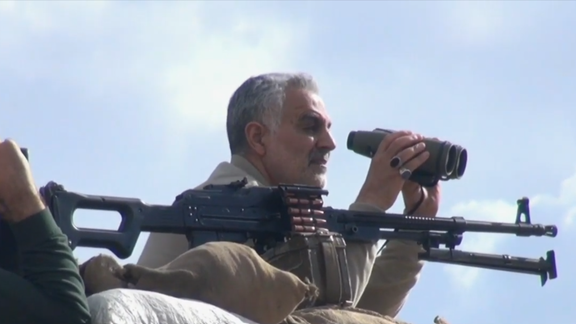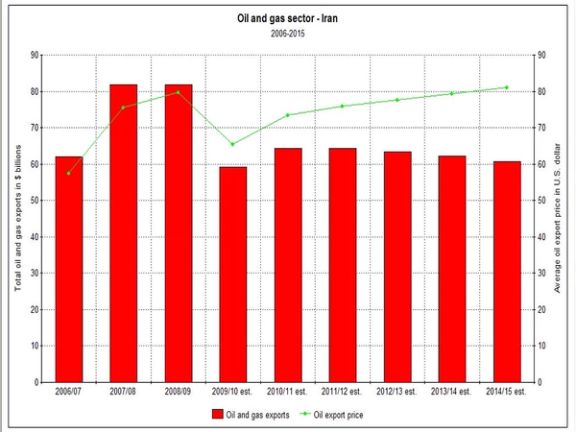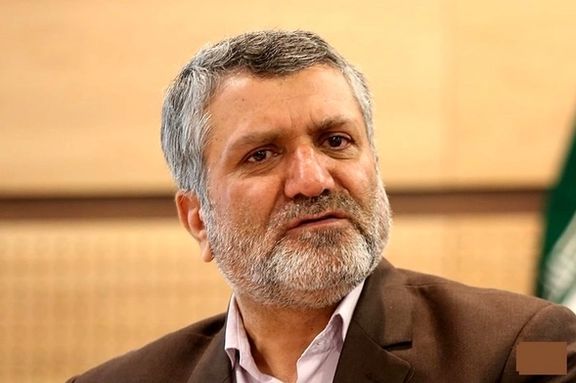Islamic Jihad Leader Says Iran's Khamenei Ordered West Bank Turmoil

The Islamic Jihad's Secretary-General, Ziyad al-Nakhala, has said that anti-Israeli actions in the West Bank reflect Iranian Supreme Leader’s directives.

The Islamic Jihad's Secretary-General, Ziyad al-Nakhala, has said that anti-Israeli actions in the West Bank reflect Iranian Supreme Leader’s directives.
He claimed in an interview with Al-Wefaq that to arm the West Bank resistance groups, weapons were either smuggled or purchased directly from the Israelis.
“There was a great focus in order for the West Bank to move from a state of coexistence and calm, to a state of resistance that we see today, and of course all of this is under the directives of Ali Khamenei,” stated al-Nakhala.
“During our last meeting with him in Tehran, he renewed the call for that and for the development of resistance in the West Bank.”
Al-Nakhala praised Iranian regime's support for the resistance, claiming: "There are those who think that Iran provides hundreds of millions of dollars a month, but I say with the least capabilities, a state of resistance has been created in Palestine, and therefore we must not exaggerate the aid."
According to Israeli Defense Minister Yoav Gallant in April, Iran is the “driving force” of a recent multi-front escalation with Israelis through its proxies across the region, funding Hamas – that rules the Gaza Strip -- with $100 million annually with additional funding worth tens of millions of dollars going to the second largest terror group in the Palestinian enclave, the Palestinian Islamic Jihad. Galant said the regime also provides Hezbollah in Lebanon with $700 million a year, as well as “knowledge and strategic weaponry” such as precision-guided munitions.

The Iranian judiciary says a court hearing over the killing of the former IRGC Quds Force Commander Qassem Soleimani killed in a US air strike will begin soon.
Kazem Gharibabadi, the deputy of Iran's Judiciary for International Affairs, said three judges are appointed for the hearings and the process will get underway shortly.
On January 3, 2020, the US military, on the orders of President Donald Trump, killed Soleimani in a drone strike near Baghdad International Airport, saying that he had been "actively developing plans to attack American diplomats and service members in Iraq and throughout the region."
The so-called trial in Iran is a symbolic political gesture.
Soleimani, who was Iran’s top military and intelligence operator outside its borders, was in charge of supporting and organizing militant proxy forces, including the Lebanese Hezbollah and Iraqi Shiite militia groups that have repeatedly attacked US forces.
Last month, Tehran issued arrest warrants for former US President Donald Trump, Secretary of State Mike Pompeo and 71 others for Soleimani's assassination.
Iran had also asked Interpol to issue a Red Notice for 36 individuals, but the request was denied, explaining it was not in accordance with its rules and constitution. “It is strictly forbidden for the organization to undertake any intervention or activities of a political, military, religious or racial character.”
The hardliner President Ebrahim Raisi also vowed revenge in January for Soleimani's killing unless former US President Donald Trump is put on trial.
Iran’s Supreme Leader Ali Khamenei also vowed revenge in a speech on January 1, saying, “Trump and others like him will be forgotten and lost in the dustbin of history, of course after paying for their crimes in the world.”

Iran aims to start oil for goods barter with Pakistan as Tehran’s finances remain bleak with rising food, medicine prices and shortages amid ongoing sanctions.
Hadi Talebian Moqaddam, a trade official, told a news website in Tehran that soon Iran will invite Pakistan to hold talks about bartering commodities and goods, with an eye “on creating free trade.” He mentioned textiles as an area where Pakistan can supply Iran, although importing rice also has a long history.
US sanctions imposed since 2018 have seriously limited Iran’s oil exports and its revenues, which are vital for supplying hard currency to a government that controls the economy and is responsible for providing food and medicine to the population.
Although the oil exports have substantially increased in the past two years, the revenues have not been sufficient for all the needs of a population reaching 85 million and an inefficient economy mired with corruption and international isolation.
The US Energy Information Administration recently estimated that Iran’s total oil exports in 2023 will reach $46 billion, but it admitted that this a rough calculation based on global energy prices, not on actual amounts Iran charges its customers.
In fact, Iran and Russia, two sanctioned countries, offer large discounts to their buyers. The amount of the discounts remains secret, but some have said that Iran might be selling its oil in clandestine ways to small Chinese refineries for as low as $40 per barrel.

What is clear is that Iran must use middlemen who mix its oil shipments with cargoes from other countries, transfer the oil to other tankers somewhere in south-Asian waters and deliver it to China as Omani, Malaysian or Iraqi oil.
In addition, it is not easy to repatriate the money in hard currency since Iran is cut off from the international banking system mainly due to US sanctions. That too costs money. All these cuts into Iran’s oil revenues, which are probably half of what the US estimate shows.
Iran’s confrontational foreign policy and its controversial nuclear program have left it far behind other regional countries like Saudi Arabia that have huge oil revenues and invest it back into infrastructure. Saudi oil revenues in 2023 are expected to reach $223 billion – at least five times that of Iran.
The picture becomes clearer if per-capita oil revenues are considered. Saudi per capita income from oil in 2023 is estimated at $6,450 and Iraq’s $2,356, while Iran’s per capita revenue is a meager $516.
In this situation, the clerical regime in Tehran boasting of its revolutionary credentials has to turn to barter trade with Pakistan, a country facing its own serious financial crisis.
Current US sanctions are not the only external reason for Iran’s economic crisis. The first serious economic sanctions began appearing 15 years ago when the international community discovered a secret Iranian nuclear program, and the UN Security Council began imposing sanctions. Since then, Iran’s average rate of economic growth has been zero, although international sanctions were lifted when the JCPOA nuclear deal with world powers was signed in 2015. After a two-year reprieve, the United States pulled out of that accord and imposed its own unilateral sanctions.
In a recent article, a relatively independent website in Iran argued that the nuclear program has cost the country 4 trillion dollars in the past 15 years, in lost growth, inflationary damage, and lack of domestic and international investments. The issue, the article argued is not just lost oil revenues but its cumulative impact on the economy, including loss of business confidence.
While Iran sits on the world’s second largest natural gas reserves, its tiny Persian Gulf neighbor Qatar exports $120 billion of LNG annually. Iran cannot match that because no Western company is willing to provide capital and technology to expand Iran’s gas fields or tap into new ones. Iran's annual losses are estimated to be much more than what Qatar is exporting.

US Senator Bill Hagerty (R-TN) has raised a series of questions about US envoy to Iran Robert Malley being on a long unpaid leave and remaining in his position.
Iran International first reported Thursday that Malley has long been absent from his job and his security clearance status was under review. The State Department after hours of delays finally admitted that Malley had been on leave. Quickly information emerged that on the same day his paid leave had turned into “unpaid leave.”
“When did the investigation that led to the suspension of Malley’s clearance begin?”, asked Sen Hagerty, and added, “When were Secretary of State Antony Blinken and President Joe Biden informed of it?”
Malley had been conspicuously absent from a Congressional briefing in May and the State Department had said that he was on personal leave due to the illness of a family member. The question raised by lawmakers is why the administration did not tell the truth to Congress about his security clearance issue.
Senator Hagerty further asked, “Why did they allow Malley to continue in his diplomatic role while under investigation?” He went further questioning Malley’s appointment in the first place, mentioning that his “contacts with Hamas and other extremist groups raised concern in the past.”
Hagerty last week introduced a bill to notify the administration that any sanctions relief for Iran must be submitted to Congress for review.
Given the fact that Malley was the US negotiator in nuclear talks with Iran and played a major role in shaping the Biden administration’s Iran policy, Sen Hagerty asked why the President created "such a powerful position for Malley" and refused to make it Senate-confirmed.
US Special Envoys normally require Senate confirmation. If they received earlier confirmation as ambassadors, administrations skip the process.

Iranian hardliners and some clerics continue demanding enforcement of hijab and issuing threats against celebrities and those who demand a more liberal lifestyle.
Repeating Supreme Leader Ali Khamenei’s decree that being unveiled is “both politically and religiously haram”, Ahmad Khatami, the ultra-hardliner Friday imam of Tehran, told a congregation gathering for special Eid ul-Adha prayers that those who are unveiled aim to weaken the pillars of family life and destroy peace of mind in the society.
“I’m telling those who are unveiled that their defiance of hijab will never become a norm, because it was, is and will be against norms,” Khatami said, complaining that some unveiled women on social media “attack those who wear it”.
“Discarding hijab is haram based on Sharia and also politically,” Khamenei declared in a speech in April. His declaration was a clear signal to officials and his loyalists to do anything it takes to re-establish control over women.
But in the past few months the regime has been struggling to enforce the hijab as successfully as it used to in previous years. Less force is being used in the streets against women due to the fear of igniting another round of anti-government protests.

“It is unbearable that those who wear the hijab and their children are assaulted in the Islamic Republic,” Khatami said and urged the authorities to take legal action. “You, authorities who are in charge, [be aware] that assault on women who wear the hijab is a crime. What and who are you waiting for? [Are you waiting for them] to commit a crime and then apologize and say they are sorry for overreacting?”
It is not clear what the firebrand cleric was referring to. There have been no attacks against women for wearing the hijab. There have been argument and scuffles in the streets when religious women on government payrollhave stopped other women to scold them for ‘improper hijab.’
Other clerics and hardliners have also been making similar allegations against unveiled women whose number has been on the rise to the extent that being unveiled is becoming “the new norm” in some Iranian cities.
Pro-hijab enforcement rally outside the Iranian parliament June 27
A video circulating on social media of a pro-hijab rally in front of the parliament June 27, shows a cleric who demands stricter enforcement of hijab rules calling the anti-compulsory hijab women “promiscuous”. The cleric claims that unveiled women are only “a minority of two to three percent [of all women] who present themselves as the majority”.
“And how many participated in this rally? Maximum 30 people. No need for further explanation,” dissident journalist Ehsan Bodaghi in Tehran tweeted about the cleric’s claim.
Authorities have been making various threats against those who defy the hijab rules since mid-March when protests that had engulfed the country for over six months became less frequent.
Iran's Police Chief Ahmad Radan in June threatened government offices that do not deny services to unveiled women with repercussions as part of hijab enforcement. Authorities have also been putting pressure on businesses including cab companies to make them enforce such rules by denying services to unveiled women.
Earlier this month students at University of Art in Tehran who had staged a sit-in protesting draconian hijab laws were assaulted by a security official of the university and several students were reportedly badly injured.
The regime has also tried to tighten its control over entertainment content in line with its policy of enforcing religious restrictions on the population and warned filmmakers not to hire actresses who have been supporting the anti-compulsory hijab movement by unveiling in public or publishing unveiled photos on social media.

Despite Twitter and other social media being blocked by the Iranian government for all citizens, the country’s labor minister has now subscribed to Twitter Blue.
Twitter Blue is an opt-in, paid subscription that adds a blue checkmark to the account and offers early access to select features, like Edit Tweet.
Seyyed Solat Mortazavi, won a vote of confidence to become the Raisi administrations’ labor and social welfare minister in October 2022.
He replaced Hojjat Abdolmaleki who resigned in June 2022 under pressure from the media and the parliament as weeks of protests by pensioners and teachers across the country threatened political stability.
As protests in Iran began in mid-September 2022, the government blocked Instagram, the only international social media platform people were allowed to use.
Other platforms including Facebook and Twitter were banned after the 2009 presidential election and Telegram in the aftermath of the November 2019 protests.
Despite the bans, Iranian officials, including Supreme Leader Ali Khamenei are present on Twitter and some have more than one account on every platform. Ordinary Iranians also continue to use social media apps by paying for VPNs [Virtual Private Networks] that allow them to circumvent the ban. However, high-level officials have unrestricted internet access.
Social media has revolutionized the authoritarian information space in Iran. The government has lost its monopoly on information and desperately tries to control the Internet. Social media has become a town square where citizens gather to criticize and berate the clerical regime.